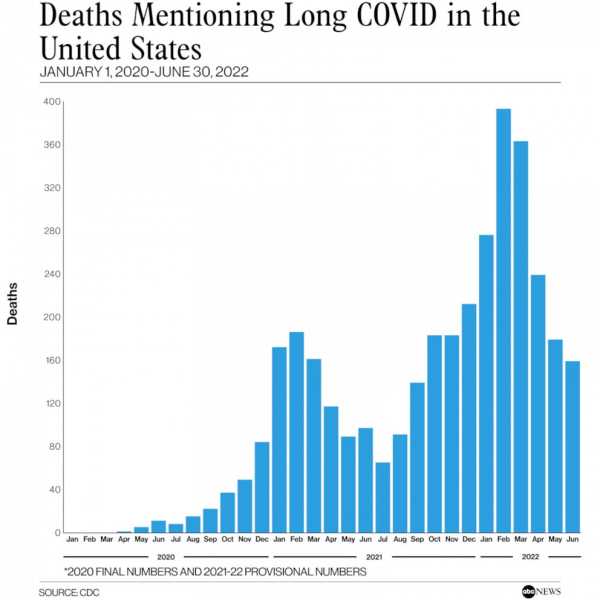More than 3,500 Americans have died from long COVID-related illnesses, according to new federal data.
The report, published early Wednesday by the Centers for Disease Control and Prevention's National Center for Health Statistics, looked at death certificate data from January 2020 through the end of June 2022.
The NCHS team looked for several key terms including "long COVID," "long haul COVID," "chronic COVID" and "post COVID syndrome."
MORE: New guidance released on diagnosing, treating long COVID symptoms
Results showed long COVID played a role in 3,544 deaths, with the condition listed as either an underlying or a contributing cause of death.
"This is the first time that we've used death certificate data from the National Vital Statistics System to identify deaths with long COVID," Farida Ahmad, a health scientist at the NCHS, told ABC News. "Because this is a new analysis and the first time we're looking at long COVID in death certificates, I think a lot of the aspects of the report stand out as unique."

Deaths Mentioning Long COVID in the United StatesCDC
While not an insignificant number, this means long COVID deaths made up less than 1% of the more than 1 million COVID-19 related deaths during this period.
Long COVID occurs when patients who have cleared the infection still have symptoms at least four weeks after recovery. In some cases, these symptoms can persist for months or even years.
Patients can experience a variety of lingering symptoms including fatigue, difficulty breathing, headaches, brain fog, joint and muscle pain, and continued loss of taste and smell, according to the CDC.
It's unclear what causes people to develop long COVID but research is ongoing.
The report found February 2022 was the month with the highest number of long COVID deaths with 393.
MORE: COVID hospitalizations at least 3 times higher among seniors than other age groups: CDC
Additionally, the percentage of deaths linked to long COVID peaked in June 2021 at 1.2% and in April 2022 at 3.8%, both of which coincided with decreasing numbers of COVID-19 deaths, according to the report.
The team then looked at differences in COVID-19 deaths and long COVID deaths between males and females over a 12-month period from July 1, 2021 to June 30, 2022.
While a larger percentage of COVID-19 deaths, or 56%, occurred among men, long COVID deaths were more evenly split with 51.5% occurring among males.
Similarly, to COVID-19, long COVID deaths were most common among elderly Americans.
Those between ages 75 and 84 accounted for 28.8% of long COVID deaths followed by those aged 85 and older at 28.1% and those aged 65 to 74 at 21.5%.

Healthcare worker Demetra Ransom comforts a patient in the Covid-19 ward at United Memorial Medical Center in Houston, Dec. 4, 2020.Mark Felix/AFP /AFP via Getty Images, FILE
There were also disparities when it came to race. White Americans made up the most deaths from long COVID at 78.5% followed by Black Americans at 10.1% and Hispanic Americans at 7.8%
Comparatively, Asian Americans, American Indians/Alaska Natives and other multiracial Americans made up less than 2% of long COVID deaths per group.
However, the long COVID death rate was highest among American Indian/Alaska Native people at 14.8 per 1 million. Meanwhile, white Americans had the second highest rate at 6.7 per 1 million.
Although Black and Hispanic Americans have traditionally higher COVID-19 mortality rates, they had lower long COVID death rates at 6.4 per 1 million and 4.7 per 1 million, respectively.
According to the report, this may be because Hispanic and Black Americans have higher COVID-19 death rates, meaning there are fewer survivors to experience long COVID, as well as fewer diagnoses due to less access to health care.
MORE: US hospitals are at their highest capacity in a year — and it's not only due to COVID
Ahmad said she hopes the report is a first step in being able to more accurately track long COVID deaths.
"We don't use an official classification code for long COVID on death certificates and so this report is kind of that first step and if we do, it might be easier to track these kinds of deaths over time," she said. "And if there is a need for kind of guidance for how deaths certificates should be filled out, when long COVID is suspected as a contributing cause of death, that might help have more accurate data on the death certificate."
Sourse: abcnews.go.com






